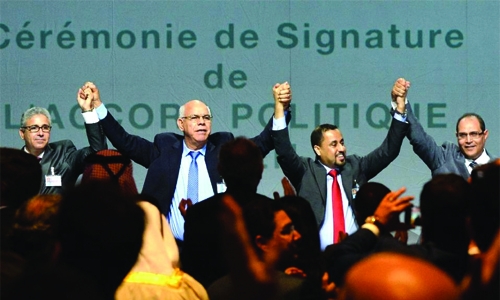Rival Libyan politicians signed a deal Thursday to form a unity government despite opposition on both sides, in what the United Nations described as a "first step" towards ending the country's crisis.
World powers have urged the warring factions to break a political deadlock that has allowed jihadists and people-smugglers to flourish since the fall of dictator Moamer Kadhafi in 2011.
A group of lawmakers from Libya's rival parliaments, as well as other political figures, inked the UN-sponsored accord in the Moroccan resort of Skhirat, an AFP journalist said.
Around 80 of 188 lawmakers from the internationally recognised parliament and 50 of 136 members of the Tripoli-based General National Congress (GNC) signed the deal, participants said.
It calls for a 17-member government, headed by businessman Fayez el-Sarraj as premier and including two women, based in Tripoli. There would also be a presidential council for a transitional period of two years up until legislative elections.
The French ambassador, Antoine Sivan, said in a statement the UN Security Council would adopt a resolution within days "recognising this government as the only legitimate government of Libya".
But the accord has caused deep divisions within Libya's two legislatures.
GNC member Mahmoud Abdelaziz complained: "There are two parliaments and two governments. Now they are going to impose a third government on us instead of bringing together the two rival authorities."
The heads of both parliaments already warned that the accord lacked legitimacy and that those who signed it represented only themselves.
GNC head Nouri Abusahmein said Wednesday "whoever has not been commissioned by the GNC to sign or initial a deal on its behalf is, and will remain, without legitimacy."
A government such as that proposed by the United Nations "does not even guarantee the minimum required to ensure its effectiveness", he added.

